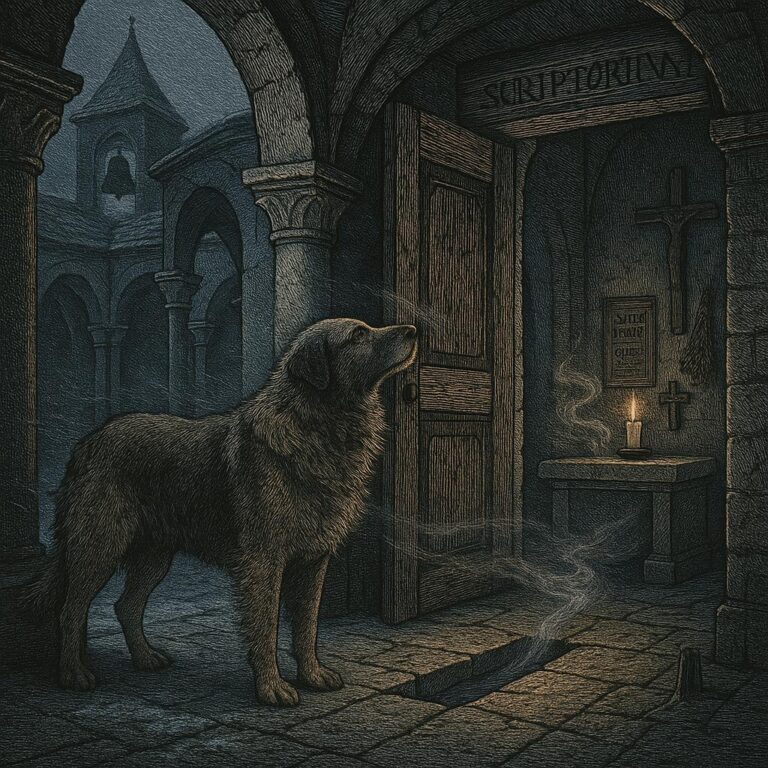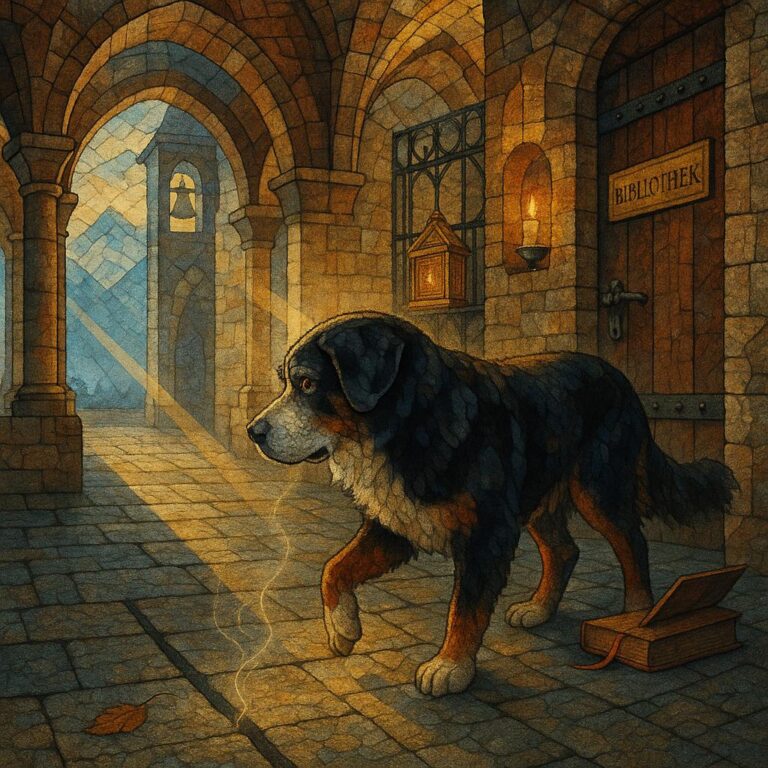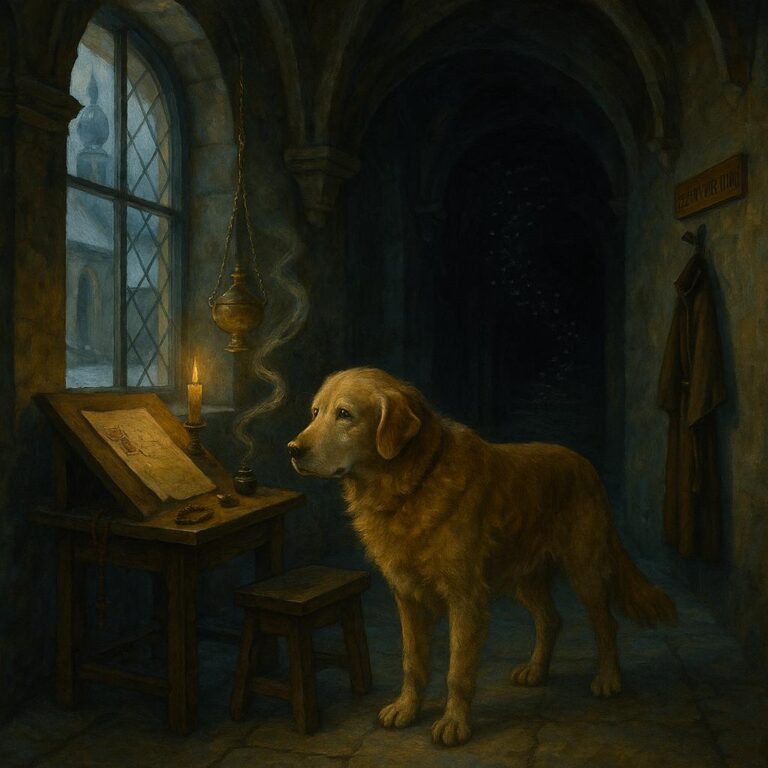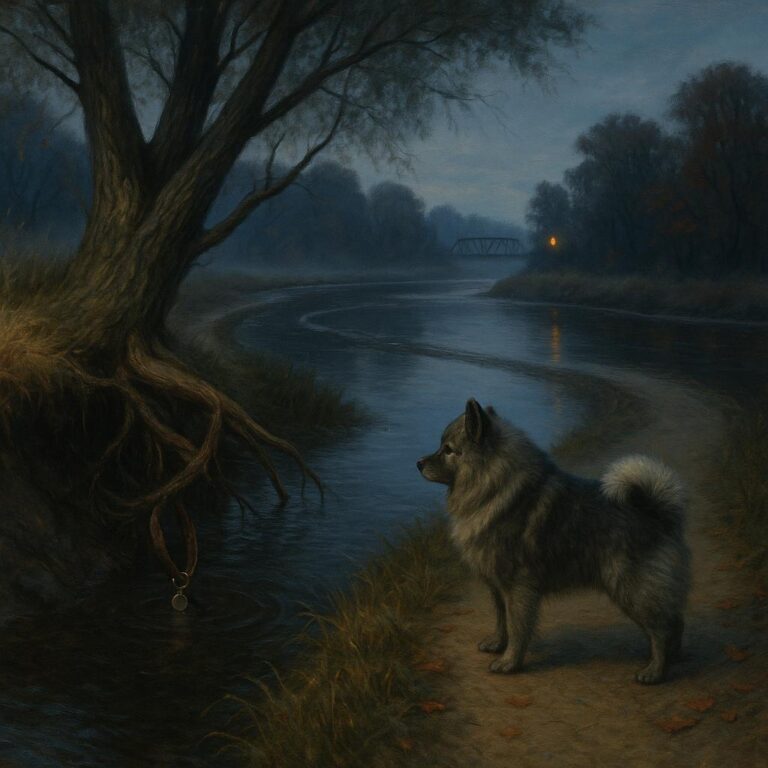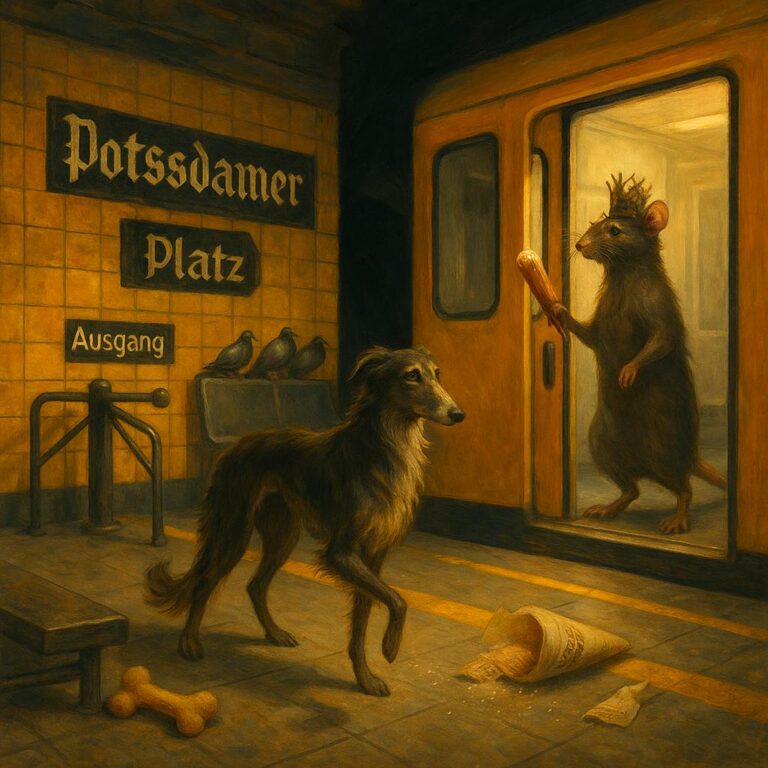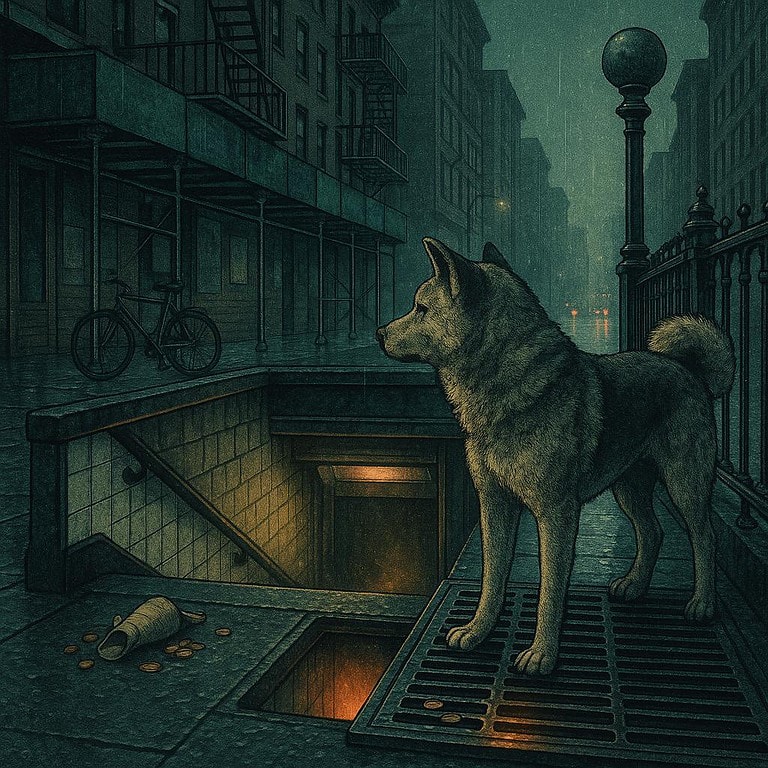Whisper for Duncan

Grim gargoyles watched as Duncan, a fourteen-year-old Scottish Terrier, nosed through the draughty keep. He once patrolled these corridors beside a boy who is now a lord far away; tonight, the wind plays that memory for him like a flute. I can still smell the kitchens, he thinks, and the ash, and her ribbon. Age weighs his joints, but pride lifts his tail as he follows a thin metallic scent toward the chapel door. It is fresh. It is wrong. The door shivers under his nose, unlatching by itself, and from the dark comes a whisper only dogs hear: Duncan.
He slips inside, claws ticking on the flagstones, the cold of the chapel climbing his old legs. Moonlight makes a pale pool beneath the stained glass, saints in broken color watching with sand-gritted eyes. Beeswax, damp stone, iron. The metallic ribbon of scent threads ahead, dragging him along the aisle, past the pew where he once slept through winter prayers, the notch where his teeth once worried a splinter in the bored patience of a pup.
Duncan. The whisper again, from the front, from the dark beneath the altar rail.
He rounds the final bench and finds a heap of cloak and man, slumped like a sack left there by careless hands. Blood shines dull on the floor, black in the moon. A hand twitches. The hand smells of old pony and peat smoke, of summer mud and split apples and a boy’s laughing breath. Something unfurls in him, a long-buried scent-path: silt from the riverbank, stale bread pilfered from a pocket, tears he once licked from small knuckles after a scraped knee. The boy, he thinks, astonished and sure all at once. My boy.
“Dunk?” The voice is a man’s now, barked low from a chest that labors, but underneath it is the nicked, familiar lilt. “Duncan?”
He pushes his muzzle under the cloak, into the guilty, hot iron of the wound. The man’s fingers find his neck, the hollow behind his ears, the old map of him. He thumps his tail once, twice—careful, careful, his joints complain—and then looks up at the rope that dangles from the bell. He remembers jumping for it as a pup, a forbidden game that rang the chapel with bright scandal. The boy had laughed and covered his ears and told him hush, hush, you rogue, and hugged him until the scolding stopped.
He backs up, squats, gathers himself. Age argues and he tells it not yet. He springs. His teeth catch coarse fiber, jolt his head, taste salt and dust. The rope swings. Far above, a note falls like a round, bright stone into a black lake. It sends ripples through the keep, into the yard, over the sleeping roofs. He jerks again, again, until the bell takes the work away and booms of its own weight, summoning.
“Easy, old lad,” the man murmurs, breath hitching. His hand goes slack and then grips again. “Good dog. Good dog.”
Feet rush, mouths shout. Light comes, swaying, in the fists of the steward and the dairy maid and a lad in his shirt. They see the blood and the lord beneath his cloak, their lord who was meant to be far away and has come in secrecy like a thief and been met by the black night anyway. They pour words and hands over him; they make a litter from doors; they lift. Duncan bars the way for a breath until he can nose his muzzle into the man’s palm. It is answered by a weak rub that smells of gratitude and pain and a promise that was never broken: you and me, always. Then they go, bustling toward sheets and stitches, toward broth and fire.
The bell hushes. The rope swings itself to stillness.
He follows as far as the threshold and stands in the draught where the kitchens used to steam. The metal tang is thinning under the clean bite of winter air. In the corner someone has kept a pan by habit, and it holds a shallow puddle that remembers soup. He licks it empty. He noses a fallen ribbon, frayed and pale as a moth’s wing, the very one she once tied to his collar on a spring fair-day. He carries it carefully to his bed of old sacking under the stairs, though he has not slept there in months for fear his stiff bones would never rise again.
Duncan, the chapel says, but more softly now. Duncan, the stones answer, a name like a round pebble warming in the palm. He settles with a sigh that reaches backward over years and forward into nothing. He can still smell the kitchens, and the ash, and her ribbon. He can smell the boy grown into a man, alive in a bed inside these walls, breath steadying, blood being told to stay.
Wind pushes through the corridors the way a hand smooths a faithful head. He closes his eyes. He sees the yard in summer, a rabbit foolish and fat under the hedge, a small hand slipping from his collar to throw him forward, the clean burst of a run that never ends. He hears the lord’s voice at the edge of sleep, laughing, young again. Good dog, Duncan. Good.
When the steward comes at dawn, he finds the terrier with his nose tucked on a strip of ribbon and a smile in his whiskers, the gargoyles outside squinting down as if they’ve always known how this would be. Later, when the lord is strong enough to stand, he asks for him, and the keep gives its quiet answer. The man kneels by the small, black body and sets a hand on the brave skull, forehead to forehead, boy to dog across all the miles between then and now.
By evening they lay Duncan under the rowan where he once dug up an entire Sunday of bulbs to everyone’s horror, and the wind knits the earth neat again. The bell stays silent. The corridors are still. The keep keeps on. Somewhere inside it, where the drafts remember names, a dog’s steps pause and go, pause and go, and stop at last beside a boy’s. And if, on some winter nights, the chapel door shivers by itself and opens a hand’s width, it is only to let a little wind through, to stir the ribbon and remind the stones to tell the old story.

